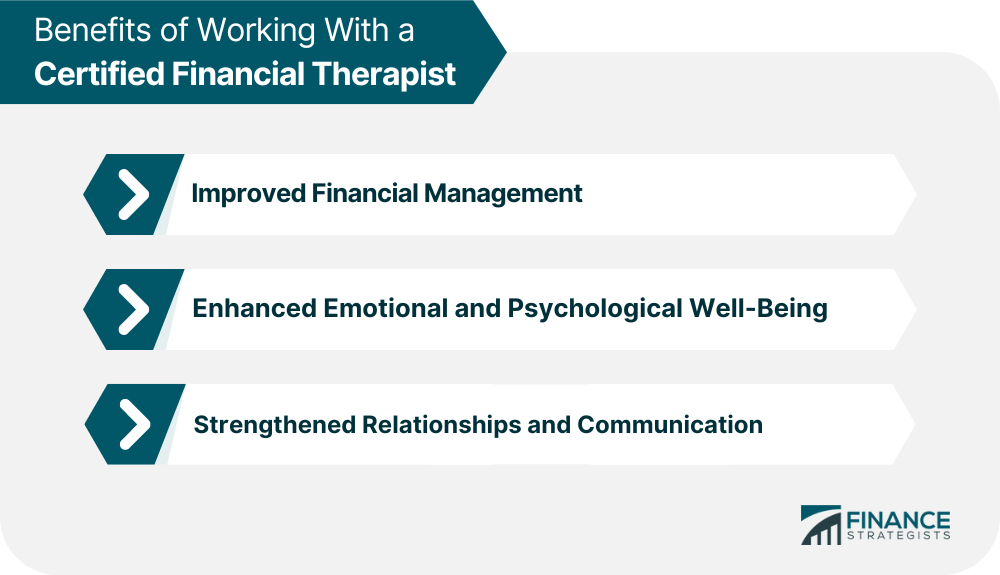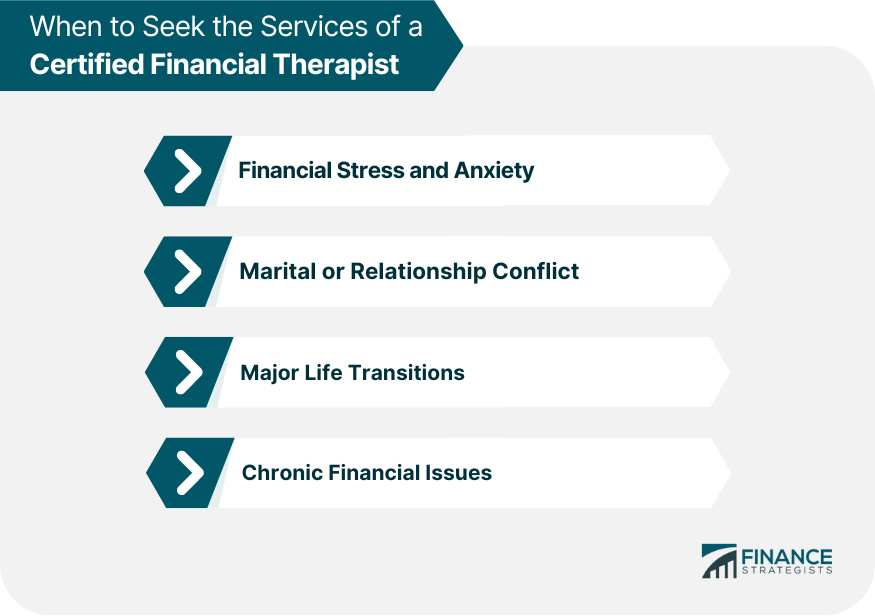Financial therapy is a holistic, collaborative, and client-centered approach to financial counseling that recognizes the importance of psychological and emotional factors in financial decision-making. It helps clients identify and address any underlying emotional, psychological, or behavioral issues that may be contributing to their financial problems. By exploring the psychological and emotional factors that influence their financial behavior, clients can better understand and overcome any barriers to financial well-being. A certified financial therapist is a professional who provides financial counseling services that incorporate psychological and emotional components. Certified financial therapists work with clients to address the emotional and psychological barriers that may be preventing them from achieving their financial goals. They help clients identify their financial strengths and weaknesses, understand their financial behaviors and attitudes, and develop plans to address any issues that may be hindering their financial well-being. Managing personal finances can be challenging and stressful, and seeking the services of a certified financial therapist can help alleviate some of these difficulties. Certified financial therapists provide a range of benefits to their clients, including improved financial management, enhanced emotional and psychological well-being, and strengthened relationships and communication. These professionals can also help clients develop healthy financial habits that can lead to long-term financial stability. To be a certified financial therapist, one must meet specific educational and training requirements. Educational requirements for certification vary depending on the certifying organization but typically involve completing a bachelor's or master's degree in a related field such as finance, psychology, or counseling. Certification programs also typically require additional training in financial therapy, such as coursework in financial psychology, financial counseling, and financial planning. Several organizations offer training and certification programs for financial therapists, including the Financial Therapy Association, the Association for Financial Counseling and Planning Education, and the Financial Psychology Institute are just a few examples. Certification programs typically require a combination of coursework, practical experience, and supervised clinical work. Lastly, certified financial therapists must complete continuing education requirements to maintain their certification. It ensures that certified financial therapists stay up-to-date with the latest research, trends, and techniques in financial therapy. It also allows certified financial therapists to expand their expertise and develop specialized skills in areas such as couples therapy, addiction, and trauma. Working with a certified financial therapist can provide a range of benefits to individuals and families who are struggling with financial issues. Here are some of the key benefits of working with a certified financial therapist: Certified financial therapists can help individuals and families improve their financial management skills by providing guidance on budgeting, debt management, saving, and investing. Financial problems can lead to significant stress, anxiety, and depression. Certified financial therapists can help clients manage their emotions and develop healthy coping mechanisms to address these issues. Financial problems can strain relationships and communication within families and couples. Certified financial therapists can help clients develop healthy communication skills and work together to achieve their financial goals. Financial therapy can be beneficial in a range of situations. Here are some of the key signs that it may be time to seek the services of a certified financial therapist: If you are experiencing significant stress, anxiety, or other negative emotions related to your finances, a certified financial therapist can help you manage these feelings and develop healthy coping mechanisms. Financial issues can strain relationships and communication within couples and families. If you are experiencing conflict related to your finances, a certified financial therapist can help you and your partner develop healthy communication skills and work together to achieve your financial goals. Major life transitions such as marriage, divorce, or the birth of a child can have significant financial implications. A certified financial therapist can help you navigate these transitions and develop a plan to achieve your financial goals. If you are struggling with chronic financial issues such as debt, overspending, or poor financial management, a certified financial therapist can help you identify the underlying causes of these issues and develop a plan to address them. If you need the help of a certified financial therapist, there are several resources available to help you. Here are some tips for finding a certified financial therapist: The Financial Therapy Association and the Association for Financial Counseling and Planning Education are two organizations that offer resources for finding certified financial therapists in your area. Financial advisors may be able to provide referrals to certified therapists specializing in financial issues, stress, and anxiety. There are several online directories of certified financial therapists, such as the Psychology Today therapist directory. Financial therapy is a valuable tool for individuals and families who are struggling with financial issues. Certified financial therapists provide a range of benefits, including improved financial management, enhanced emotional and psychological well-being, and strengthened relationships and communication. If you are experiencing financial stress, anxiety, or conflict, or if you are struggling with chronic financial issues, it may be time to seek the services of a certified financial therapist. By working with a certified financial therapist, you can develop healthy financial habits that will lead to long-term financial stability and emotional well-being. Consult with a qualified financial advisor for further guidance on managing your finances and recommendations on a good financial therapist.Financial Therapy: Overview
What Is a Certified Financial Therapist?
The Importance of Working With a Certified Financial Therapist
How to Become a Certified Financial Therapist
Benefits of Working With a Certified Financial Therapist
Improved Financial Management
Enhanced Emotional and Psychological Well-Being
Strengthened Relationships and Communication

When to Seek the Services of a Certified Financial Therapist
Financial Stress and Anxiety
Marital or Relationship Conflict
Major Life Transitions
Chronic Financial Issues

Finding a Certified Financial Therapist
Professional Associations
Referrals From Financial Advisors
Online Directories
Final Thoughts
Certified Financial Therapist FAQs
A Certified Financial Therapist is a professional who provides financial counseling services that incorporate psychological and emotional components. Certified Financial Therapists work with clients to address the emotional and psychological barriers that may be preventing them from achieving their financial goals.
A Certified Financial Therapist can help you identify and address any underlying emotional, psychological, or behavioral issues that may be contributing to your financial problems. By exploring the psychological and emotional factors that influence your financial behavior, you can better understand and overcome any barriers to financial well-being.
Working with a Certified Financial Therapist can provide a range of benefits, including improved financial management, enhanced emotional and psychological well-being, and strengthened relationships and communication. Certified Financial Therapists can also help you develop healthy financial habits that can lead to long-term financial stability.
To become a Certified Financial Therapist, you need to meet specific educational and training requirements. Educational requirements for certification vary depending on the certifying organization, but typically involve completing a bachelor's or master's degree in a related field such as finance, psychology, or counseling. Certification programs also typically require additional training in financial therapy, such as coursework in financial psychology, financial counseling, and financial planning.
Professional associations such as the Financial Therapy Association and the Association for Financial Counseling and Planning Education offer resources for finding Certified Financial Therapists in your area. Referrals from financial advisors may also be helpful, and there are online directories of Certified Financial Therapists available, such as the Psychology Today therapist directory.
True Tamplin is a published author, public speaker, CEO of UpDigital, and founder of Finance Strategists.
True is a Certified Educator in Personal Finance (CEPF®), author of The Handy Financial Ratios Guide, a member of the Society for Advancing Business Editing and Writing, contributes to his financial education site, Finance Strategists, and has spoken to various financial communities such as the CFA Institute, as well as university students like his Alma mater, Biola University, where he received a bachelor of science in business and data analytics.
To learn more about True, visit his personal website or view his author profiles on Amazon, Nasdaq and Forbes.











